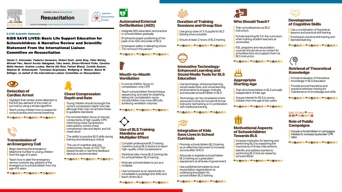Kids Save Lives (KSL)
Kids Save Lives: Training Schoolchildren to Give Basic Life Support for Cardiac Arrest Can Save Lives, Major Review Finds.
European Resuscitation Council calls for life support training to be made compulsory in all EU schools.
Training schoolchildren to give basic life support in case of cardiac arrest can help save lives and boost survival rates, according to the first major review of international research.
The International Liaison Committee on Resuscitation (ILCOR), which carried out the review, said in a statement that teaching children basic life support, including chest compression, can help save lives and boost survival rates.
Reacting to these findings, the European Resuscitation Council (ERC) is calling for basic life support training to be made compulsory in all schools across the European Union (EU).
Cardiac arrests are the third biggest cause of death after cancer in the EU. Survival rates are currently very low, around 8%, and are especially low if bystanders aren’t able to provide basic life support.
The statement highlights good news about the role that children can play in helping cardiac arrest sufferers.
By 10-12 years of age, children can perform chest compression to effective depths and achieve sufficient levels of ventilation. Children from the age of four can assess the first steps in the chain of actions needed to ensure survival in the event of cardiac arrest. In addition, children help to spread the knowledge of how to respond to cardiac arrests by sharing what they have learned with their family members.
The study found that school children are keen to learn basic life support skills from an early age. The review covers North and South America, Europe, Asia, Australia, New Zealand and South Africa.
Cardiac arrest cuts off the supply of oxygen to the brain and brain damage can occur within five minutes unless action is taken to help the sufferer. The most effective way to prevent brain damage is to restore the supply of oxygen by starting basic life support immediately, which primarily includes hard and fast chest compressions and, if possible, ventilation and defibrillation.
If bystanders can start and continue basic life support until emergency services arrive, the chances of survival and avoiding long-term brain damage increase significantly.
The six European countries that have compulsory basic life support training for schoolchildren are: Belgium, Denmark, France, Italy, Portugal and the UK.
A complete copy of the statement is available @ResusJournal.

